- Center for Educational Excellence (CEE)
- About the Center
- Conferences
- Conferences we organized
- Conferences we participated
- Research Associations
- Language
- Culture
- Education
- Environment
- Research Talks and Professional Development
- Publications
- Local
- International
Conferences we organized
1. FLTAL 2018
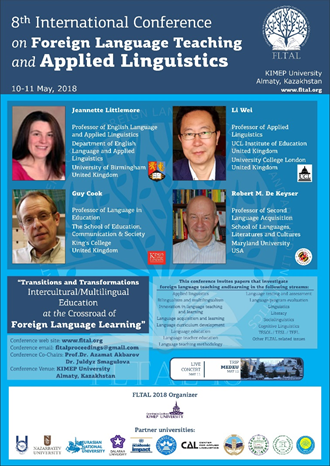
The 8th Annual International Conference on Foreign Language and Applied Linguistics (FLTAL) organized jointly by CHE and partners took place on May 10th & 11th, 2018, at KIMEP University. There were 104 participants from 12 countries (USA, Great Britain, Brazil, Poland, Iran, Turkey, South Korea, Serbia, Uzbekistan, Kyrgyzstan, Tajikistan) who took part in the conference, including 11 teachers from Almaty schools and gymnasiums. The plenary speakers at the conference were Dr. Jeannette Littlemore, Professor at the University of Birmingham (Great Britain), Dr. Guy Cook, Professor at King’s College (Great Britain) and Dr. Robert De Kaiser, Professor at the University of Maryland (USA). It was a notable event which focused on sharing research and building new networks.
2. KIMEP Student Conference 2018
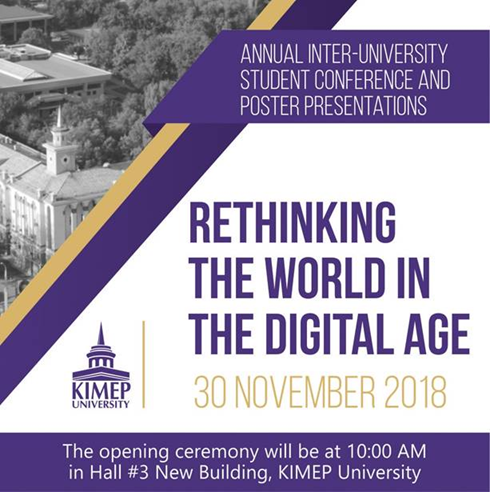
CHE in collaboration with BCB and CSS organized 4th Annual Inter-University Student Conference on 30 November, 2018. The theme was “Rethinking the World in the Digital Age” welcoming undergraduate and graduate students from any field and university. The conference aimed to give students an opportunity to share their recent research, essays or presentations with the audience at large and initiate a discussion on their topics of interest. In addition, a poster exhibition was ongoing throughout the conference.
Conferences we participated
| Faculty / Students* | Conference / Training |
| Dr. Konstantinos Kristofer Dimitriou | 3rd International Conference on Communication Across Cultures. Warsaw, Poland, 6-7 December |
| Ms. Nuraisha Bekeyeva |
4th International Scientific Research Congress – IBAD 2019, Uppsala, Sweden, 25-26 April |
| Dr. Juldyz Smagulova | MAPRYAL Congress, Nur-Sultan, Kazakhstan, 29 April – 3 May |
| Ms. Kamiya Abdulkhakimova | 9th Annual Conference on Foreign Language Teaching and Applied Linguistics – FLTAL 2019, Tashkent, Uzbekistan, 2-3 May |
| Ms. Karina Narymbetova | |
| Ms. Yelena Babeshko | |
| Dr. Konstantinos Dimitriou | |
| Dr. Kara Fleming | |
| Ms. Akmaral Kurmangalieva | |
| Ms. Darina Omurzakova | |
| Dr. George Rueckert | |
| Ms. Arailym Sarbassova | |
| Dr. Maganat Shegebayev | |
| Ms. Laila Yermenbayeva | |
| Dr. Zauresh Yernazarova | |
| Mr. Turgan Zhanadilov | |
| Ms. Wenyi Du* | |
| Ms. Gulnar Karimova* | |
| Ms. Veronika Khuturova* | |
| Ms. Ulbolssyn Parmanova* | |
| Mr. Yongjian Si* | |
| Ms. Nadja Tigay* | |
| Ms. Amina Zhemeney* | |
| Ms. Nuraisha Bekeyeva | 72-hour training courses on the Latin Script. Almaty, Kazakhstan, 3-17 June |
| Ms. Laila Yermenbayeva | 72-hour training courses on the Latin Script. Almaty, Kazakhstan, 3-17 June |
| Ms. Kamiya Abdulkhakimova | 18th Nordic Literacy Conference & the 21st European Conference on Literacy in Copenhagen, Copenhagen, Denmark, 4-7 August |
| Ms. Karina Narymbetova | 18th Nordic Literacy Conference & the 21st European Conference on Literacy in Copenhagen, Copenhagen, Denmark, 4-7 August |
| Ms. Yelena Babeshko | 18th Nordic Literacy Conference & the 21st European Conference on Literacy in Copenhagen, Copenhagen, Denmark, 4-7 August |
| Dr. Askat Tleuov | The European Conference on Educational Research – ECER 2019, Hamburg, Germany, 3-6 September |
About the Center
Mission:
The Center for Educational Excellence (CEE) at KIMEP University is dedicated to assisting the university in fulfilling its commitment to maintaining teaching excellence at undergraduate and graduate levels and fostering the enhancement of research capacity of faculty. CEE strives to enhance the quality of learning, teaching, scholarship and educational management by being a change agent supporting the transformation of the Kazakhstan’s system of education.
The CEE aims to conduct various topical professional development events to ensure faculty are exposed to training that would include the most current and best evidence-based practices in teaching, doing research, educational management within and outside of their respective areas of expertise. These workshops may be conducted and certified by internal faculty or external professionals in order to help faculty fulfil a minimum of 15 hours of professional development per academic year.
CEE will pursue two purposes:
1) provide professional development to all full-time KIMEP faculty in a variety of areas and
2) offer professional development to external educational institutions and professionals.
CEE will primarily draw on the expertise of KIMEP University faculty when in designing and conducting professional development events. CEE shall also collaborate with external educational organizations to achieve aforementioned purposes.
Rationale:
The CEE would address several gaps in the market by offering unique, high-quality professional development activities that also happen to satisfy the needs of current educational reforms in Kazakhstan.
Firstly, the target audience of the CEE would primarily be the academic staff of higher education institutions, which is a segment of the market that no organization in Kazakhstan has adequate resources to systematically cater for. The need for professional development of university instructors is stimulated by the standards of the Independent Kazakh Agency for Quality Assurance in Education (IQAA). In particular, Standard #6 of IQAA requires universities to demonstrate the availability of a system for qualification upgrade and professional development of their staff. To add to this, the ministry demands that each full-time faculty member goes through professional development. For these reasons, the establishment of the CEE seems relevant and important. It would, on one hand, help KIMEP meet the requirements of the IQAA and the ministry and, on the other, become a center of qualification upgrade and professional development for the academic staff of other universities in Kazakhstan.
Secondly, the provisional content of the CEE program (i.e. Multilingual Education, English for Specific Purposes, Content and Language Integrated Learning, Curriculum Development and Evaluation, Educational Leadership and Research) is unique in nature in that a) it does not overlap with other analogues programs and b) is delivered through the medium of three languages: Kazakh, Russian and English. To our best knowledge, no other center of excellence in Kazakhstan has such capacity. It is also worth pointing out that College of Humanities and Education of KIMEP University is the only body in Kazkahstan that has an internationally accrediated (AQ Austria) Master degree program (MA FL) and has highly-qualified, experinced professionals that can successfully run professional development courses with the establishment of CEE.
Thirdly, as part of the broader process of internationalization of higher education and science, the ministry has set certain requirements such as scholarly publishing in international peer-reviewed journals for local PhD students and researchers. However, local academia members (including PhD students) do not always have sufficient capacity to meet such requirements. The CEE could design and provide research capacity building programs/courses to address this need.
Main activities:
The CEE aspires to offer professional development in four main directions:
– Excellence in Educational Leadership – training of educational managers (Rectors, Deans, School Principals, administrators, etc.) to develop their capacity to guide effective change within major educational reforms in Kazakhstan. The special focus will be on program evaluation, international accreditation process and organizational change.
– Excellence in Teaching and Learning – training of university instructors primarily and school teachers to enhance the quality of education in Kazakhstani’s higher education institutions and schools. The program aims to promote evidence-based pedagogical practices that foster student academic engagement, learning, and success. Special focus will be on English-medium instruction and multilingual education.
– Excellence in Research – training of young researchers to increase their research capacity in aspects such as advanced-level academic writing, research design, data collection and analysis, dissemination of data and scholarly publishing.
– Language and Preparatory Courses
Local Publication
- Abdramanova, S. (2018). Semantic analysis of Kazakh idioms with components of body parts and colours. Al-Farabi Kazakh National University Eurasian journal of philology: Science and education, 2(171), 58-66.
- Bekeyeva, N. (2018). Teaching the Kazakh language as a means of professional communication and linguistics. Al-Farabi Kazakh National University Eurasian journal of philology: Science and education, 3(171), 192-197.
- Lee, S. J. (2018). Input talks: A case study of one experienced preschool teacher’s use of English input. Journal of learner-centered curriculum and instruction, 18(16), 263-282.
- Lee, S. J. (2017). Effect of two types of feedback on accuracy development of L2 writing. Journal of learner-centered curriculum and instruction, 17(17), 575-594.
- Бекеева, Н. (2018). Қазақ тілін кәсіби қарым-қатынас құралы ретінде оқыту және лингвоелтаным бағыты. Eurasian journal of philology: Science and education, 3 (171), 190-195.
- Ерназарова, З. Ш. (2018). Қазақ тілін оқутыдың аксиологиялық бағыты. Әл-Фараби атындағы ҚазҰУ, Хабаршысы, филология сериясы, 2(170), 201-208.
- Ерназарова, З. Ш., Досмамбетова, Д. & Смагулова, Ж. (2015). Казахский язык для учащихся общеобразовательных школ с русским языком обучения, 5 класс. Алматы: Атамура.
- Курманалиева, А. М. (2018). Әдебиет әлемінде: жалпы білім беретін мектеп оқұшыларына арналған танымдық оқу құралы. Алматы: Елтаным баспасы.
- Тлеуов, А. (2018). Экономика публикационного режима и проблемы интеграции казахстанских ученых в глобальное научное сообщество. Central Asian Economic Review, 4, 128-138.
- Смагулова, Ж. (2008). Словарь социолингвистических терминов (Dictionary of Sociolinguistic Terminology). Астана: Арман.
International Publication
1. Ahn, E. & Smagulova, J. (Eds.)(2016). Language change in Central Asia. Berlin: Mouton de Gruyter. [In the Contributions to the Sociology of Language series edited by Joshua Fishman].
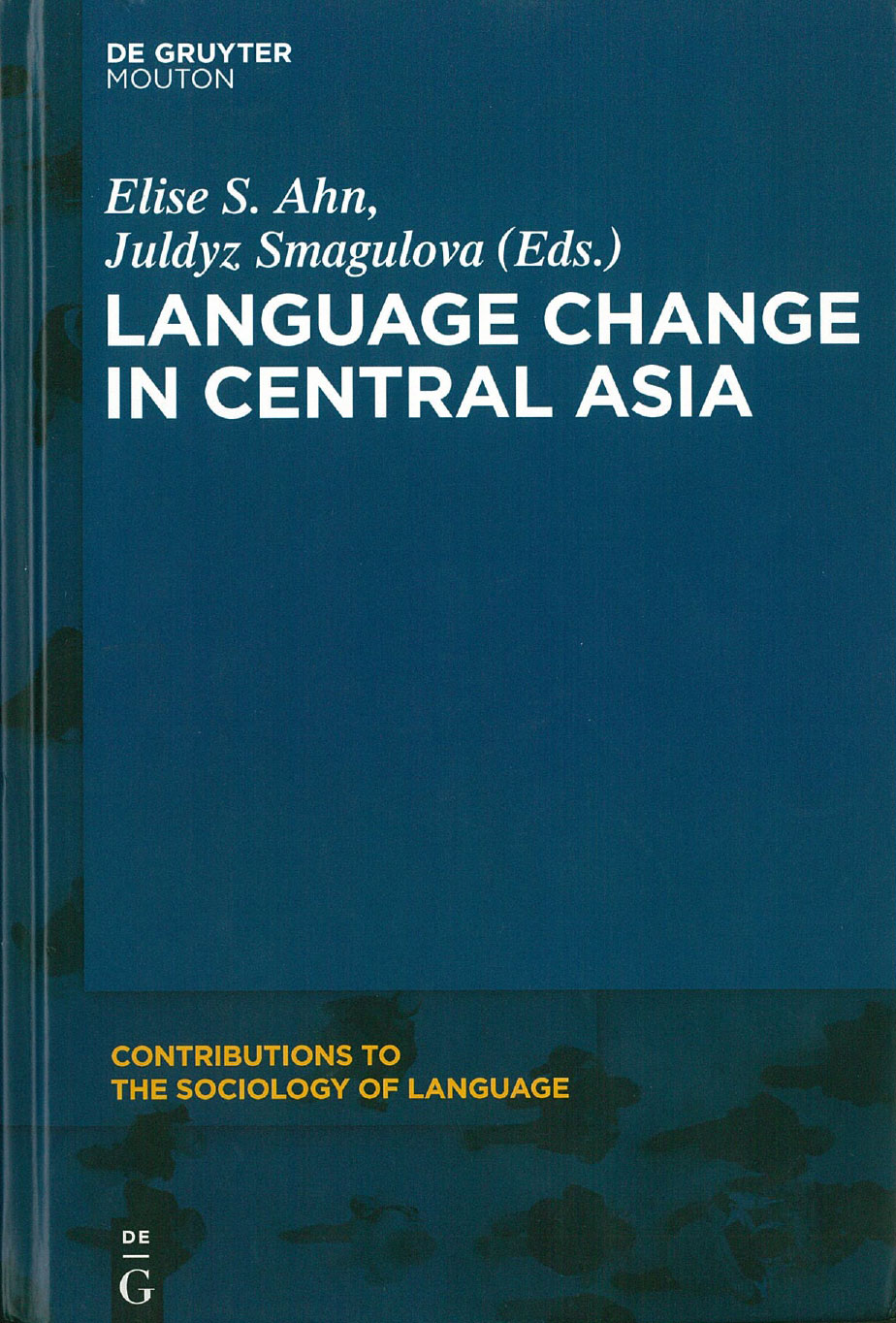
2. Fleming, K. (2019). Language, scale and ideologies of the national in Kazakhstan. In Barrett T. A. & Dovchin, S. (Eds.), Critical inquiries in the sociolinguistics of globalization (pp. 66-83). Bristol: Multilingual Matters.

3. Fleming, K. (2019). Who is “diverse”?: (In)Tolerance, education, and race in Hong Kong. In Gube, J. & Gao, F. (Eds.), Education, ethnicity and equity in the multilingual Asian context (pp.89-103). Cham: Springer.

4. Fleming, K. (2019). Transformative multilingualism?: Class, race and linguistic repertoires in Hong Kong. In Jasper, J. & Madsen, L. M. (Eds.), Critical perspectives on linguistic fixity and fluidity: Languagised lives (pp. 122-145). London: Routledge.
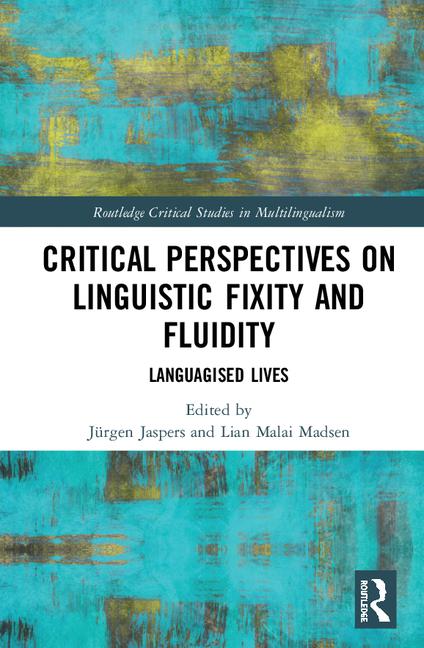
5. Shegebayev, M. (2019). Emergence of the Latin alphabet in Soviet Central Asia and the Caucasus: A brief history. In Brunn, S. & Kehrein, R. (Eds.), Handbook of the changing world language map (pp. 1-7). Cham: Springer.
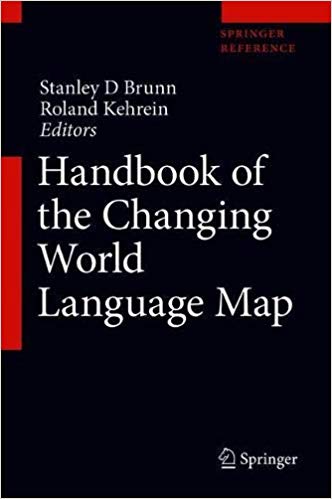
Research Talks and Professional Development
Research & Professional Development Events Schedule
FALL 2019
| Date and Time | Room | Event | Speaker / Facilitator |
| Sept 5 at 3:00 pm | VB 302 | New Literacies for a New Era | Dr. Douglas K. Hartman |
| Sept 12 at 3:00 pm | VB 302 | Beyond Neo-Liberal Academia: Review of Alternative Measures for Research Impact | Olga Mun, DPhil |
| Oct 3 at 2:30 pm | VB 6 | Central Asian Painting | Nurbol Nurakhmet |
| Oct 10 at 3:00 pm | VB 302 | EuroPass: The European Language Passport | Dinara Karimova |
| Oct 17 at 3:00 pm | VB 302 | Where to Go with Multilingualism? | Dr. Alexandre Duchene |
| STUDY BREAK: 21.10-27.10 | |||
| Oct 31 at 3:00 pm | |||
| Nov 7 at 3:00 pm | VB 302 | Poetry Reading: Broadcasts from the Natural World | John Westbrook, MFA |
| Nov 14 at 3:00 pm | |||
| Nov 21 at 3:00 pm | VB 302 | Phone App Use for Learning and Improving Engagement | Dr. Konstantine Dmitriou |
| Nov 28 at 3:00 pm | |||
| Dec 5 at 3:00 pm | VB 302 | Ideologies of State and Script Change in Kazakhstan | Dr. Kara Fleming |
The Language Research Association
Dr. Kara Fleming
kfleming@kimep.kz
The Language Research Association operates within the CHE to promote and support research related to language, linguistics, and language teaching.
The association includes scholars working in sociolinguistics, theoretical linguistics, and applied linguistics. We are especially interested in developing research within the following areas, related to a variety of international contexts but with a particular view toward developing research on Central Asia:
– Language policy
– Linguistic minorities
– Language ideologies
– Language acquisition and teaching (in collaboration with the Educational Research Association)
– Syntax
We host a series of seminars on language and linguistics, and we also involve KIMEP students in research and promotion of linguistics and language studies. We welcome collaboration with researchers working on similar topics; for more information, please contact Dr. Kara Fleming, at kfleming@kimep.kz.
THE CULTURAL RESEARCH ASSOCIATION
John Westbrook
dr.j.westbrook@kimep.kz
The Cultural Research Association seeks researchers who are interested in pursuing research in all aspects of cultural production and theory. Whether you are seeking to publish creative works or simply to contribute to international discourse on culture, we would encourage you to join this Association.
The group will meet three times per semester to provide a supportive, interdisciplinary research environment for colleagues with similar creative and research interests. In addition to fostering an environment for researchers to receive feedback on independent projects, the Association will initiate a collaborative project with a view to publication within three years.
THE EDUCATIONAL RESEARCH ASSOCIATION
Dr. Askat Tleuov
a.tleuov@kimep.kz
The Educational Research Association aims to design and undertake empirical, conceptual and policy research in education in a wide range of national and international contexts. Education is defined broadly to encompass all the relevant settings and fields from kindergarten to higher education and from classroom to system-wide policy research. We welcome collaboration of scholars across disciplines to produce high-quality research outputs with national and international significance.
We are interested in pursuing these broad research areas:
– Teacher education and professional development
– Language education
– Assessment practices in education
– Curriculum development
– Inclusive education
– Internationalization of education and research
– Educational leadership, management and governance
– Academic practice and research culture
– Policies and education
– Quality assurance in education
THE ENVIRONMENTAL RESEARCH ASSOCIATION
Professor Vivienne Westbrook
dr.v.westbrook@kimep.kz
The Environmental Research Association in CHE is open to researchers who wish to contribute to our understanding of the relationship between human society and the planet with the aim of increasing awareness of, and changing, practices that negatively impact on natural resources. In this group there is a special focus on oceans, seas and shorelines across history, culture, law, science and industry.
The seventy per-cent of our planet that is blue has often been represented as endlessly self-replenishing but as more research emerges it is becoming clear that it is under severe pressure from climate change and over-exploitation.
This Research Association uses collaborative cross-disciplinary research to contribute to international debates that spotlight the issues affecting the oceans, seas and shorelines and their representations across cultural media.
Research Associations
Dear Colleagues,
Our new College of Humanities and Education at KIMEP has taken on an ambitious new project to set up a scholarly journal. To that end, we are putting together “Research Associations” of research-active scholars across KIMEP. These working groups fall into four categories: Language, Culture, Education, and Environment.
If you are a scholar doing research in any of these areas, and would be interested in collaborating with us, please reply to Dr. George Rueckert at rueckert@kimep.kz as soon as possible. We would be very happy to include you in our projects and discussions.
Sincerely,
Dr. George R. Rueckert
Asst. Prof. for English and Translation
Director of Undergraduate and Graduate Programs
KIMEP College of Humanities and Education

